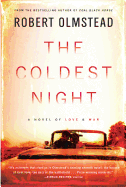
Over a trilogy of novels, Robert Olmstead has chronicled a century of war and its aftermath in the lives of the men of the Childs family. In Coal Black Horse, Robey Childs confronts the horrors of the Civil War in search of his father; then Napoleon Childs chases Pancho Villa through the mountains of Mexico in Far Bright Star. In the concluding volume, The Coldest Night, Olmstead brings us the even darker tale of Robey's grandson Henry.
In the first part of the novel, the young Henry finds some comfort in horses, baseball and a romance with Mercy, the impetuous daughter of a wealthy judge. When they elope to New Orleans, the judge sends Mercy's brother to bring her home and beat Henry senseless, a warning not to follow her back.
He enlists in the Marine Corps, where "they gave him three meals a day and a roof over his head, and he fired his rifle and screamed and bayoneted straw dummies. They told him he would be one of them forever." However, in the winter snow and cold of the Korean mountains, Henry learns that no one is anything forever. His Marine family is slaughtered, the few survivors left "deep in the coma of war, walking back down that frozen road... icicles of blood hanging from their bodies."
His aunt, a nurse, takes him in and attempts to ease him back into the world. He visits Mercy again, now alone with a daughter he never knew he fathered, and finds that their love is still alive. The Coldest Night is a bleak story told with harsh realism, offering only the slightest window of hope. --Bruce Jacobs

